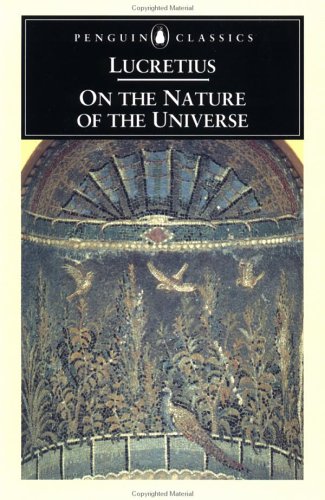Break Nature's Locks to Reveal Truth
When human life lay groveling in all men's sight, crushed to the earth under the dead weight of superstition whose grim features loured menacingly upon mortals from the four quarters of the sky, a man of Greece was first to raise mortal eyes in defiance, first to stand erect and brave the challenge. Fables of the gods did not crush him, nor the lightning flash and the growling menace of the sky. Rather, they quickened his manhood, so that he, first of all men, longed to smash the constraining locks of nature's doors. The vital vigor of his mind prevailed. He ventured far out beyond the flaming ramparts of the world and voyaged in mind throughout infinity. Returning victorious, he proclaimed to us what can be and what cannot: how a limit is fixed to the power of everything and an immovable frontier post. Therefore superstition in its turn lies crushed beneath his feet, and we by his triumph are lifted level with the skies.
One thing that worries me is the fear that you may fancy yourself embarking on an impious course, setting your feet on the path of sin. Far from it. More often it is this very superstition that is the mother of sinful and impious deeds. Remember how at Aulis the altar of the Virgin Goddess was foully stained with the blood of Iphigineia by the leaders of the Greeks, the patterns of chivalry. The headband was bound about her virgin tresses and hung down evenly over both her cheeks. Suddenly, she caught sight of her father, standing sadly in front of the altar, the attendants beside him hiding the knife and her people bursting into tears when they saw her. Struck dumb with terror, she sank on her knees to the ground. Poor girl, at such a moment it did not help her that she had been first to give the name of father to a king. Raised by the hands of men, she was led trembling to the altar. Not for her the sacrament of marriage and the loud chant of Hymen. It was her fate in the very hour of marriage to fall a sinless victim to a sinful rite, slaughtered to her greater grief by a father's hand, so that a fleet might sail under happy auspices. Such are the heights of wickedness to which men are driven by superstition.
You yourself, if you surrender your judgment at any time to the blood-curdling declamations of the prophets, will want to desert our ranks. Only think what phantoms they can conjure up to overturn the tenor of your life and wreck your happiness with fear. And not without cause. For, if men saw that a term was set to their troubles, they would find strength in some way to withstand the hocus-pocus and intimidations of the prophets. As it is, they have no power of resistance, because they are haunted by the fear of eternal punishment after death. They know nothing of the nature of the spirit. Is it born, or is it implanted in us at birth? Does it perish with us, dissolved by death, or does it visit the murky depths and dreary sloughs of Hades? Or is it transplanted by divine power into other creatures, as described in the poems of our own Ennius, who first gathered on the delectable slopes of Helicon an evergreen garland destined to win renown among the nations of Italy? Ennius indeed in his immortal verses proclaims that there is also a Hell, which is peopled not by our actual spirits or bodies but only by shadowy images, ghastly pale. It is from this realm that he pictures the ghost of Homer, of unfading memory, as appearing to him, shedding salt tears and revealing the nature of the universe.
Notes:
Give up superstitious fears, Lucretius tells us, which oppress us and prompt us to do vile things.
Folksonomies: nature superstition classic
Taxonomies:
/religion and spirituality (0.578630)
/society/sex (0.447990)
/society/social institution/marriage (0.447602)
Keywords:
immovable frontier post. (0.937048 (neutral:0.000000)), superstitious fears (0.799595 (negative:-0.610370)), flaming ramparts (0.797680 (neutral:0.000000)), vile things (0.791629 (negative:-0.627791)), grim features (0.784899 (neutral:0.000000)), Break Nature (0.784746 (negative:-0.610370)), dead weight (0.782374 (neutral:0.000000)), challenge. Fables (0.781578 (neutral:0.000000)), vital vigor (0.780746 (neutral:0.000000)), human life (0.780414 (neutral:0.000000)), dreary sloughs (0.777801 (neutral:0.000000)), mind prevailed. (0.777551 (neutral:0.000000)), lightning flash (0.775963 (neutral:0.000000)), mortal eyes (0.774872 (neutral:0.000000)), virgin tresses (0.769885 (negative:-0.258020)), sinful rite (0.767165 (negative:-0.662371)), impious course (0.765319 (negative:-0.549585)), impious deeds (0.765175 (negative:-0.719631)), delectable slopes (0.764048 (neutral:0.000000)), murky depths (0.763244 (neutral:0.000000)), ghastly pale. (0.759870 (neutral:0.000000)), shadowy images (0.758927 (neutral:0.000000)), blood-curdling declamations (0.755770 (neutral:0.000000)), loud chant (0.753774 (negative:-0.328088)), Virgin Goddess (0.752376 (negative:-0.325370)), Poor girl (0.751251 (negative:-0.755333)), eternal punishment (0.751021 (neutral:0.000000)), unfading memory (0.750227 (neutral:0.000000)), sinless victim (0.749348 (negative:-0.662371)), immortal verses (0.749195 (neutral:0.000000))
Entities:
Greece:Country (0.719972 (negative:-0.417196)), Ennius:Person (0.678362 (negative:-0.350955)), Lucretius:Person (0.625015 (negative:-0.254916)), Iphigineia:City (0.522918 (negative:-0.325370)), Italy:Country (0.448106 (positive:0.243519)), four quarters:Quantity (0.448106 (neutral:0.000000))
Concepts:
Man (0.877575): dbpedia | freebase
Sin (0.830715): dbpedia | freebase
Superstition (0.815754): dbpedia | freebase | opencyc
Power (0.798588): dbpedia
Victoria Justice (0.739590): website | dbpedia | freebase | yago





